Gain insights into the biblical debate on fermented wine, uncovering historical, linguistic, and cultural layers that challenge modern perceptions.
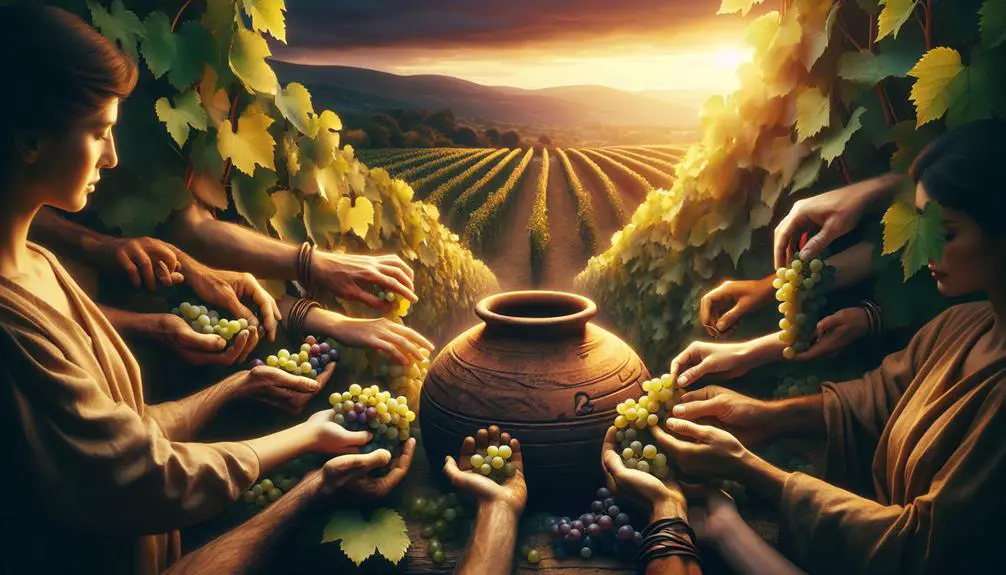
Was Wine Fermented in the Bible
Isn't it intriguing how a book as ancient as the Bible still fuels debates today, especially on topics like whether wine was fermented? You might find it fascinating to explore how historical, linguistic, and cultural contexts converge to shed light on this question.
The Bible mentions wine numerous times, but interpretations of these references vary widely. By examining the evidence from different angles—historical practices of winemaking, biblical passages, linguistic nuances, and even scientific insights into fermentation—you'll uncover layers of understanding that might change how you view ancient texts and their relevance to modern discussions on alcohol.
This journey promises to reveal more than just the contents of a wine cup.
Key Takeaways
- The Bible contains references to wine, indicating its fermented state and cultural significance.
- Fermentation, a process known to ancient societies, is essential in turning grape juice into wine.
- Biblical and linguistic evidence suggests wine was commonly consumed and likely fermented.
- The science of winemaking, including yeast biology and fermentation, aligns with historical practices described in biblical narratives.
Historical Context of Winemaking
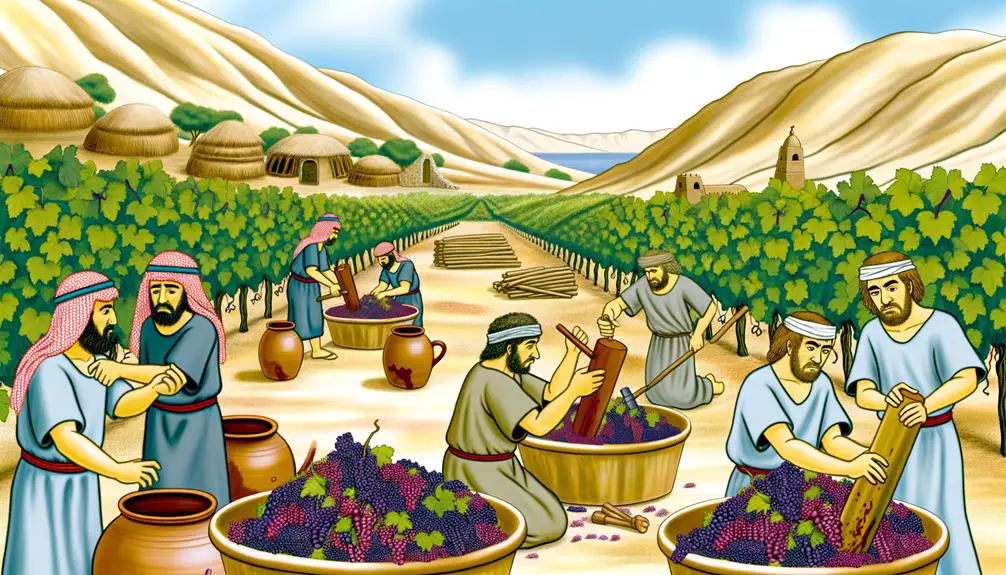
Winemaking, a tradition deeply rooted in history, has played a pivotal role in both cultural and religious practices since ancient times. It's not just about the transformation of grape juice into wine; it embodies a complex interplay of agricultural skills, geographic location, and socio-economic factors. You'll find that grape cultivation and trade routes significantly influenced the development and dissemination of winemaking techniques across civilizations.
Grape cultivation, the cornerstone of winemaking, required a deep understanding of the land and climate. The ancient winemakers knew that the quality of the wine depended greatly on the terroir—the unique environment in which the grapes were grown. This knowledge dictated the locations of vineyards and the grape varieties cultivated, shaping the distinct characteristics of wines produced in different regions.
Trade routes played a crucial role in the spread of winemaking knowledge and the wine itself. As traders moved from region to region, they carried with them not only goods but also skills, including winemaking techniques. These routes facilitated the exchange of ideas and innovations, allowing winemaking to evolve and adapt to new environments. They also enabled the distribution of wine, making it accessible to diverse cultures and elevating its status to a commodity of significant economic and social value.
Analyzing the historical context of winemaking reveals how grape cultivation and trade routes were instrumental in its growth and sophistication. This interconnection between agriculture, commerce, and culture highlights the complexity of winemaking as a craft and its impact on society throughout history.
Biblical References to Wine
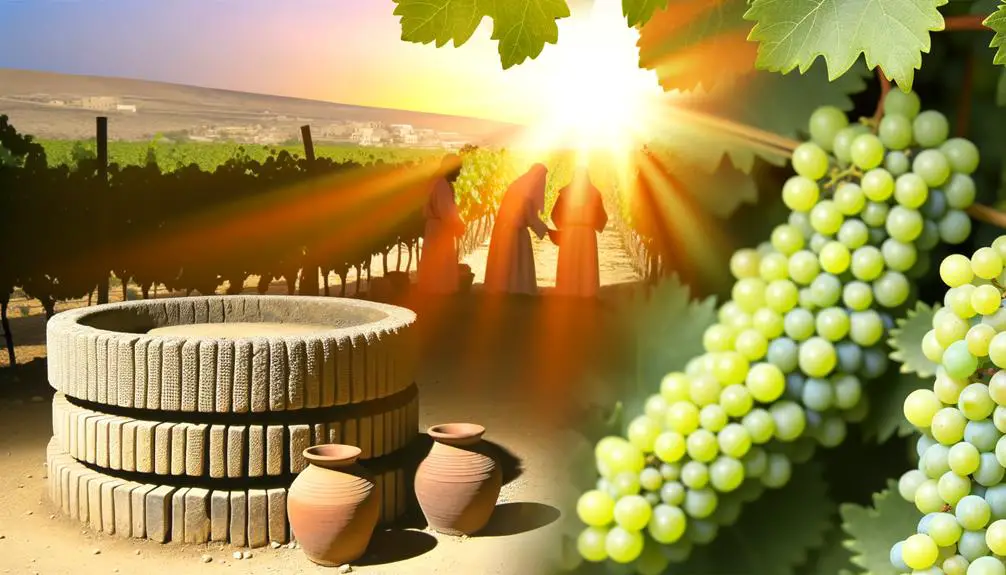
The Bible's narrative intricately weaves references to wine, illustrating its significance in various religious and cultural contexts throughout ancient times. You'll find wine not only as a staple of daily living but also deeply embedded within the fabric of rituals, celebrations, and even legal codes. It's portrayed as a symbol of joy, prosperity, and divine blessing, as well as a potential source of folly and moral downfall, reflecting the nuanced understanding of its benefits and dangers.
Miracle accounts, particularly in the New Testament, highlight wine's religious significance. Most notably, Jesus turning water into wine at the Cana wedding (John 2:1-11) not only serves as the first recorded miracle but also symbolizes the transformational power of faith and the new covenant between God and humanity. This act underscores wine's esteemed role in biblical narratives, bridging the human and divine.
Drinking laws within the Bible further reveal the complex relationship our ancestors had with wine. Leviticus 10:9 and Numbers 6:3, for instance, impose restrictions on consumption for priests and Nazarites, underscoring the importance of sobriety in certain religious duties and periods of consecration. Yet, Deuteronomy 14:26 presents a contrasting view, allowing for the purchase of wine for joyful consumption during religious feasts, emphasizing its role in celebration and community bonding.
These references, among others, articulate a balanced perspective on wine, acknowledging its capacity to enrich and to detract from spiritual and communal life. They offer a window into the ancient world's intricate cultural and religious landscapes, where wine was more than a beverage; it was a multifaceted symbol woven into the very fabric of life.
Linguistic Evidence
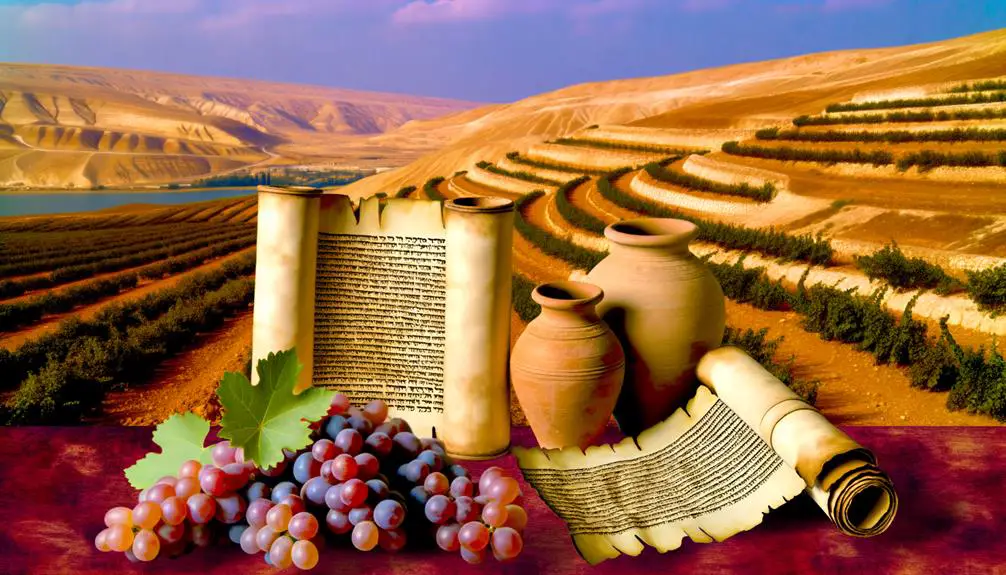
Delving into the linguistic evidence, we observe that ancient texts provide a rich tapestry of terminology related to wine, reflecting its deep cultural and religious significance. The words used to describe wine and its processes in biblical times have undergone significant terminology evolution, revealing much about the ancient practices and attitudes toward wine. Understanding these terms and their original contexts requires a careful consideration of translation nuances, which can sometimes obscure the true nature of wine in antiquity.
- *Yayin* and *Oinos*: These Hebrew and Greek words, respectively, are commonly translated as 'wine' in modern versions of the Bible. Their frequent occurrence underlines the ubiquity of wine in ancient Near Eastern and Mediterranean cultures. However, the broad application of these terms in ancient texts suggests a variety of fermented grape beverages, not limited to the specific wine products we're familiar with today.
- *Tirosh*: Often translated as 'new wine,' this term points to the early stages of wine fermentation. It highlights the processual nature of wine production, indicating a beverage that has begun to ferment but hasn't reached full maturation. This distinction is crucial for understanding the different stages of wine consumption and its socio-religious connotations.
- *Sikera*: A term found in Luke's Gospel, likely referring to a strong, fermented drink, distinct from grape wine. Its inclusion demonstrates the diversity of fermented beverages within biblical references and the importance of specific terminology in distinguishing between them.
These linguistic markers provide a window into the ancient world, underscoring the complexity of wine's role across different cultures and epochs. They invite a deeper exploration into how translation nuances and terminology evolution can shape our understanding of historical texts.
Cultural Practices of the Time
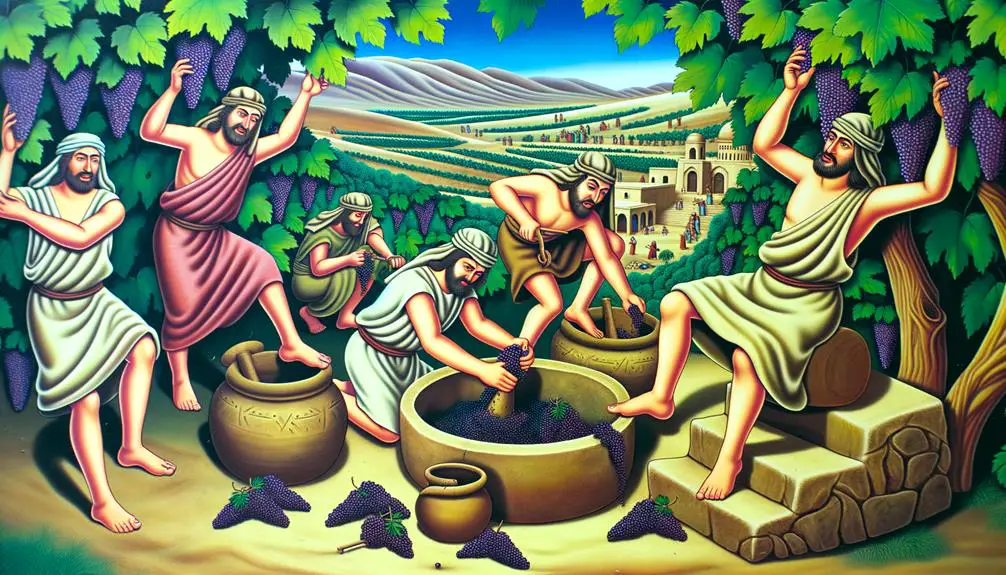
Understanding the cultural practices of the time reveals how integral wine was to daily life, religious ceremonies, and social gatherings in ancient societies. Wine wasn't merely a beverage; it symbolized prosperity, was a marker of civilization, and played a pivotal role in binding communities. You'd find that agricultural rituals often centered around the grape harvest, underscoring wine's significance in both the economy and the spiritual lives of people. These rituals weren't just about giving thanks for the harvest but also about invoking divine favor for future bounty.
Wine's role extended into the realm of hospitality and social norms. Hosting guests without offering wine could be perceived as a slight, showcasing how deeply ingrained it was in the fabric of social etiquette. Moreover, wine was an essential component of food pairings, with its consumption elevating meals from mere sustenance to a more communal and celebratory event. This was particularly evident during feasts and religious festivals, where wine facilitated a sense of unity and shared joy among participants.
In analyzing these cultural practices, you gain insights into how wine transcended its status as a mere drink. It was a catalyst for community cohesion, a symbol of divine blessing, and an integral part of the socio-economic landscape. The agricultural rituals and food pairings of the time aren't just historical footnotes but key elements in understanding the multifaceted role wine played in ancient societies. Through this lens, the biblical references to wine take on a deeper significance, reflecting its embeddedness in the cultural and religious tapestry of the time.
Scientific Insights Into Fermentation
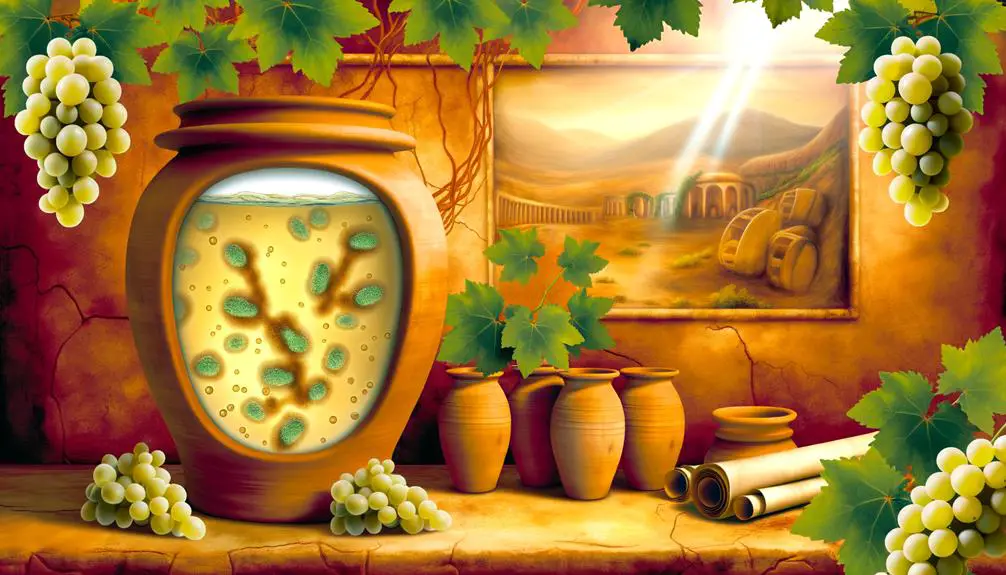
Science's understanding of fermentation reveals it's not just a natural process but a complex biochemical reaction crucial for wine production. At its core, this transformation hinges on yeast biology and the intricate chemical reactions that occur when yeast converts sugars present in grape juice into alcohol and carbon dioxide. This process, while seemingly straightforward, is influenced by numerous factors that can alter the flavor, aroma, and quality of the wine.
Here's a deeper look into what makes fermentation so fascinating:
- Yeast Selection: Different strains of yeast can produce vastly different flavor profiles in wine, showcasing the importance of yeast biology in the fermentation process. The choice of yeast strain is a critical decision that winemakers must make to achieve the desired outcome.
- Temperature Control: The temperature at which fermentation occurs significantly impacts the speed of the chemical reactions. Too high, and the yeast may die or produce undesirable flavors; too low, and the fermentation process could halt prematurely.
- Oxygen Exposure: Limited oxygen exposure is necessary for yeast to multiply, but excessive oxygen can spoil the wine. Managing oxygen levels is a delicate balance that influences the chemical reactions during fermentation.
Understanding these aspects of fermentation from a scientific perspective provides insight into the complexity of wine production. It's not merely about letting grape juice sit until it transforms; it's a carefully controlled process that requires knowledge of yeast biology and the chemical reactions at play. This understanding bridges the gap between ancient practices and modern techniques, highlighting how science has refined and enhanced the art of winemaking.
Frequently Asked Questions
How Do Modern Religious Practices Interpret the Use of Wine Mentioned in the Bible, and Does It Influence Their Current Stance on Alcohol Consumption?
You're delving into how modern religious groups interpret biblical references to wine and its impact on their views on alcohol.
Many see wine in a historical-religious context, advocating for moderation or even abstention based on scripture. This stance affects their current views on alcohol consumption, balancing tradition with contemporary health and moral considerations.
Essentially, your understanding of wine in religious texts directly informs and shapes ongoing debates about its place in modern faith practices.
Were There Any Significant Health Implications or Medicinal Uses of Wine Recognized in Biblical Times That Differ From Today's Understanding?
In biblical times, wine was a Swiss Army knife for health, tackling everything from disinfecting wounds to easing depression's grip.
Today, you'd find its role slightly shifted, with modern health benefits spotlighting heart health and diabetes risk reduction.
Interestingly, what once cured now requires caution, as wine's place in alcohol addiction treatment is delicate.
Analyzing this evolution, it's clear our understanding of wine's health implications has matured, yet remains rooted in ancient practices.
How Did the Symbolic Meaning of Wine in the Bible Evolve Over Time, and How Is It Represented in Contemporary Religious Ceremonies?
In exploring how wine's symbolic meaning has evolved, you'll find its roots in grape cultivation and its journey to sacramental symbolism. Initially a sign of prosperity and blessing, its significance deepened over time.
In contemporary religious ceremonies, wine symbolizes the blood of Christ, embodying sacrifice and covenant. This evolution from a simple agricultural product to a core spiritual symbol reflects profound shifts in cultural and religious perceptions.
Can Archaeological Findings and Artifacts Shed Light on the Exact Methods of Wine Storage and Preservation in Biblical Times?
Yes, archaeological discoveries can indeed illuminate the exact methods of wine storage and preservation used in biblical times. By examining ancient vessels, storage facilities, and remnants of grape cultivation, scholars piece together how ancient people managed fermentation techniques.
These findings offer a tangible link to understanding the past, providing insights into the sophistication of early winemaking practices. This research bridges historical knowledge with the technical aspects of ancient viticulture and enology.
What Role Did Wine Play in the Economy and Trade of Ancient Societies Mentioned in the Bible, Outside of Its Cultural and Religious Significance?
In ancient societies, wine wasn't just a drink; it was a dynamic driver in the economy and trade, transcending its cultural and religious roles. Vineyard locations were strategically selected, impacting trade routes significantly.
You'll find that these areas weren't just about grape growing; they were economic hubs, facilitating trade across vast regions. Analyzing this, you'll see wine's role was multifaceted, influencing both local economies and broader trade networks profoundly.
Conclusion
As you've explored, wine's presence in the Bible is undeniable, woven through historical, linguistic, and cultural fabrics.
Think of winemaking as a vine, deeply rooted in ancient practices, stretching through time to bear the fruit of today's knowledge.
With evidence suggesting fermentation was understood and practiced, it's clear that what we enjoy today isn't just a beverage, but a sip of history, cultured through centuries.
This journey from past to present demonstrates not only the evolution of winemaking but the enduring significance of wine in human culture.

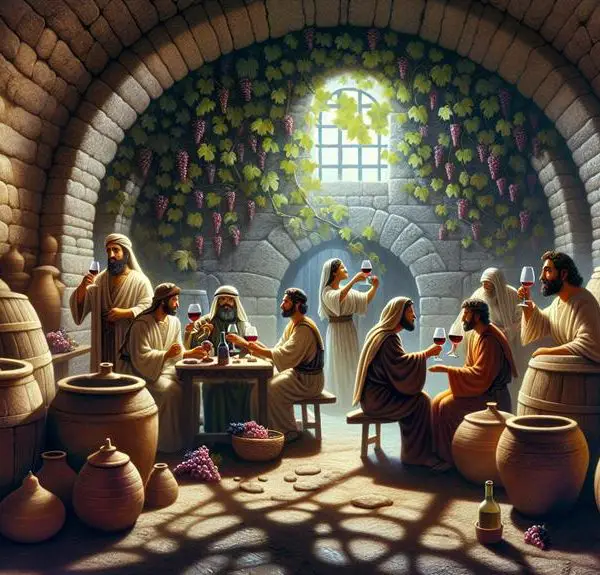

Sign up